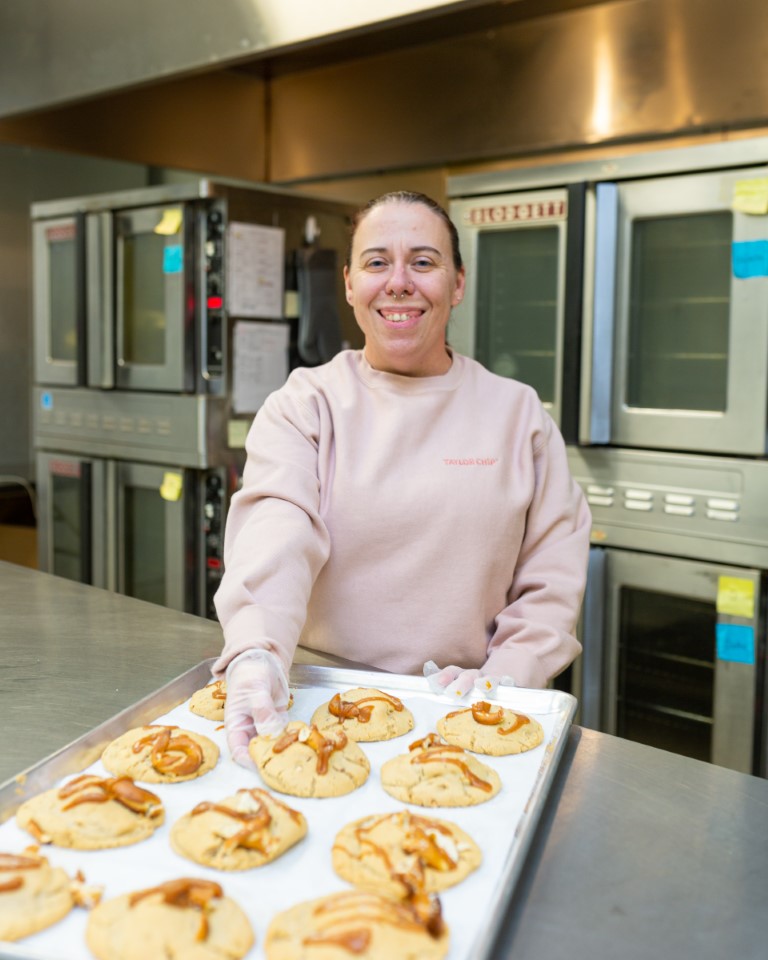You can't bake cookies on wax paper because it might melt, create smoky odors, and even pose a fire risk. Wax paper is great for rolling dough and wrapping, but not for high heat. When wax paper melts, it can stick to your cookies, ruining their texture and presentation. Parchment paper is a much safer option because it can handle oven temperatures and provides a non-stick, easy-to-clean surface. You might also consider silicone baking mats for a reusable, heat-resistant option. For more tips on using these alternatives effectively, let's explore the realm of safe cookie baking practices.
Key Takeaways
- Baking cookies on wax paper is not recommended due to the risk of wax melting and potential fire hazards.
- Wax paper's wax coating can melt, causing cookies to stick and affect taste and texture.
- Parchment paper is a safer alternative for baking cookies, offering non-stick benefits and heat resistance.
- Wax paper is suitable for dough preparation and wrapping but not for high-temperature baking.
- Silicone baking mats and parchment paper are preferred for safe and effective cookie baking.
Understanding Wax Paper and Parchment Paper
When you're baking, it's vital to understand the differences between wax paper and parchment paper. Wax paper is coated with a thin layer of wax, making it non-stick but not heat-resistant, while parchment paper is specifically designed to withstand high temperatures. Using the wrong type can affect your baking results, so knowing how heat interacts with each paper is important.
Key Differences Between Wax Paper and Parchment Paper
Understanding the key differences between wax paper and parchment paper is essential for any home baker. Wax paper is coated with a thin layer of wax, making it moisture resistant and non-toxic, ideal for tasks like rolling dough or wrapping food. However, it's not suitable for baking sheets as it can melt. On the other hand, parchment paper is treated with silicone, providing a non-stick surface perfect for baking. It can withstand higher temperatures, making it safe for lining baking sheets without fear of melting. Both papers are non-toxic, but their distinct properties impact how you use them in the kitchen. Choose parchment paper for baking tasks and reserve wax paper for moisture-resistant needs like storage and prep.
How Heat Affects Each Type of Paper
Knowing the key differences between wax paper and parchment paper helps you make informed choices, especially when it comes to their performance under heat. Wax paper, often mistaken for greaseproof paper, isn't heat-resistant and can melt or catch fire in the oven. It's best reserved for non-heated tasks. On the other hand, parchment paper, also known as baking paper, can withstand high temperatures, making it perfect for baking cookies. It creates a nonstick surface, eliminating the need for additional grease or nonstick cooking spray.
If you don't have parchment paper, consider using silicone baking mats. They offer a reusable, heat-resistant alternative. Avoid using wax paper in the oven to prevent any accidents, and always choose the right material for your baking needs.

Choose Your Own Delightfully Perfect Cookies.
With almost 30 flavors to choose from, you can make your box as unique as you are.
Why You Should Not Bake Cookies on Wax Paper
When you bake cookies on wax paper, you're risking a smoky kitchen or, worse, a fire hazard because the wax can melt and ignite in the oven. Besides safety concerns, melted wax can stick to your cookies, ruining their taste and texture. For the best baking results, always choose parchment paper over wax paper.
Safety Risks of Using Wax Paper in the Oven
Baking cookies on wax paper can frequently lead to more problems than you might anticipate. While wax paper might seem like a convenient option, it presents considerable safety risks when used in the oven. Wax paper is coated with a thin layer of wax, which can melt during the baking time, potentially seeping into your cookie dough. Unlike food-safe paper designed for baking, such as parchment, wax paper is not heat-resistant. This lack of heat resistance can cause the wax to smoke or even ignite at high temperatures, posing a fire hazard. To guarantee safety, avoid using wax paper in the oven altogether. Instead, opt for alternatives like parchment paper to keep your baking environment safe and your cookies uncontaminated.
How Wax Paper Can Ruin Your Cookies
Imagine pulling a tray of cookies out of the oven only to find them stuck to the wax paper and ruined. Wax paper seems like a common household item that should simplify baking, but it's not suitable for the oven. When used on baking trays, the wax coating can melt or even catch fire, turning your baking dreams into kitchen mishaps. The melted wax glues cookies to the paper, making it nearly impossible to remove them intact. Instead, stick with a reliable cookie sheet or parchment paper, both designed to handle oven temperatures. Don't let this kitchen item turn your baking experience into a disaster. Choose the right tools to guarantee your cookies come out perfect every time.
Best Alternatives for Baking Cookies
When you're looking for alternatives to wax paper for baking cookies, consider using parchment paper for its non-stick benefits and ease of use. Silicone baking mats are another great option, providing reusable and durable surfaces for perfect cookies every time. If you're in a pinch, aluminum foil can work as a last resort, though it may not offer the same non-stick properties.
Parchment Paper Benefits and Usage
To achieve perfectly baked cookies, parchment paper is a baker's best friend, offering a host of benefits that wax paper can't match. As a cooking professional, you'll find parchment paper to be the perfect option for consistent results. Its non-stick surface guarantees cookies slide right off without sticking, reducing cleanup time. This durable paper withstands high oven temperatures, making it ideal paper for baking tasks. Unlike wax paper, parchment won't smoke or melt, maintaining the flavor and integrity of your cookies.
Additionally, its heat resistance helps in even baking, preventing burnt edges or undercooked centers. You can also reuse parchment for multiple batches, making it an economical choice. So, next time you're baking, grab parchment paper for flawless cookies every time.
Silicone Baking Mats for Cookie Making
Silicone baking mats are a smart alternative for baking cookies, offering convenience and reliability. Unlike wax paper, silicone mats don't melt or smoke under high heat, making them a kitchen staple for cookie enthusiasts. They provide a non-stick surface, ensuring your cookies slide right off without breaking apart. You can also use them as a cookie decorating surface, keeping your counters clean and tidy.
When preparing your dough, mix your dry ingredients on a silicone mat to minimize mess, then roll it directly on the mat without needing extra flour. The durability of silicone mats means you won't have to frequently replace them, saving you money in the long run. Embrace silicone baking mats for a seamless cookie-baking experience.
Aluminum Foil as a Last Resort
Turning to aluminum foil as a last resort for baking cookies is something every baker has considered at some point. While not ideal, aluminum foil can be a substitute when you're out of options like wax paper or silicone mats. In cooking school, you might learn that although foil can withstand high temperatures, it doesn't offer the non-stick quality that kitchen paper alternatives do. So, if you must use aluminum foil, lightly grease it to help prevent sticking.
Safe Ways To Use Wax Paper in Cookie Making
When handling cookie dough, you can use wax paper to keep your workspace clean and prevent sticking. It's also handy for wrapping dough before storing or freezing, ensuring the dough retains its moisture and flavor. Just remember, while wax paper is great for preparation and storage, it shouldn't go in the oven.
Cookie Dough Preparation Tips
A key tip for preparing cookie dough is to understand how to safely use wax paper, especially since it isn't oven-safe. Use wax paper to roll out your dough without sticking to the rolling pin or countertop. It's a great alternative to tissue paper when you're handling delicate doughs. Here are some cookie dough preparation tips:
- Dust wax paper with powdered sugar to prevent sticking without altering taste.
- Use wax paper as a barrier to avoid extra flour, maintaining dough consistency.
- Lift and turn dough using wax paper to guarantee even thickness.
- Prevent messes by rolling dough between sheets of wax paper.
- Refer to cake recipes for additional tips on using wax paper effectively.
These tips will streamline your cookie-making process.
Storage and Freezing Methods
Often, wax paper becomes an essential tool when storing and freezing cookie dough. You can roll your dough into logs, wrap them tightly in wax paper, and then cover them with plastic wrap to prevent freezer burn. This method is similar to how you'd prepare homemade ice cream sandwiches. For longer storage, consider using freezer paper, which adds an extra layer of protection. When you're ready to bake, simply slice off what you need.
If you've already baked your cookies, wrap them individually in wax paper before placing them in a lunch bag sandwich style, ensuring they stay fresh. This paper wrap method is ideal for keeping cookies separated and maintaining their shape, making your baking efforts more efficient and delicious.
Our Journey to Cookie Perfection: Why Trust Our Baking Insights
At Taylor Chip, our expertise in cookie baking isn't just about following recipes—it's a passion that's been years in the making. Since 2015, Sara and Dougie Taylor have been on a relentless quest to create the perfect cookie, turning their shared love for sweets into a craft they've honed to perfection.
What started as a fun date night activity quickly evolved into an obsession, leading them to experiment with various techniques, ingredients, and baking methods. Their journey of trial and error, which culminated in mastering the art of cookie baking just in time for their wedding, has equipped them with invaluable insights into the nuances of baking. This hands-on experience has given them a deep understanding of how different ingredients interact, the importance of precise measurements, and the critical role that factors like temperature and baking surfaces play in achieving the perfect cookie.
When we discuss topics like the dangers of using wax paper for baking or the benefits of alternatives like parchment paper and silicone mats, we're not just repeating information—we're sharing knowledge gained through countless hours of practical experience in our own kitchen.
Frequently Asked Questions
Can Wax Paper Catch Fire in the Oven?
You're wondering if wax paper can catch fire in the oven. It can, since it's not heat-resistant like parchment paper. Always use parchment paper when baking to avoid any fire hazards and guarantee safe cooking.
Are There Any Cookies That Can Be Safely Baked on Wax Paper?
You might think some cookies can be baked on wax paper, but it's not safe. Wax paper isn't heat-resistant and could smoke or catch fire. Always use parchment paper or a silicone baking mat for safe baking.
How Does Wax Paper Affect Cookie Texture and Flavor?
Wax paper can cause cookies to spread unevenly and stick. You might find the texture slightly uneven and the flavor a bit off due to wax melting. For best results, use parchment paper instead.
Can Wax Paper Be Used to Line a Baking Sheet for Other Baked Goods?
You shouldn't use wax paper to line baking sheets for any baked goods. The wax can melt and catch fire in the oven. Instead, opt for parchment paper or silicone baking mats, which are heat-resistant and safer.
What Are Common Myths About Using Wax Paper in Baking?
You might think wax paper can handle baking heat, but it can't. A common myth is it's similar to parchment paper. Wax paper will smoke or melt in the oven, so it's best for non-heat tasks.
Conclusion
When baking cookies, always choose parchment paper over wax paper to avoid a sticky, smoky mess. Wax paper can melt and ruin your treats, while parchment provides a non-stick, heat-resistant surface. Remember, the right tools make all the difference. If you're out of parchment, use silicone baking mats or a greased baking sheet instead. Wax paper still has its place in the kitchen, like for rolling dough or wrapping cookies. Keep your baking sweet and stress-free!








